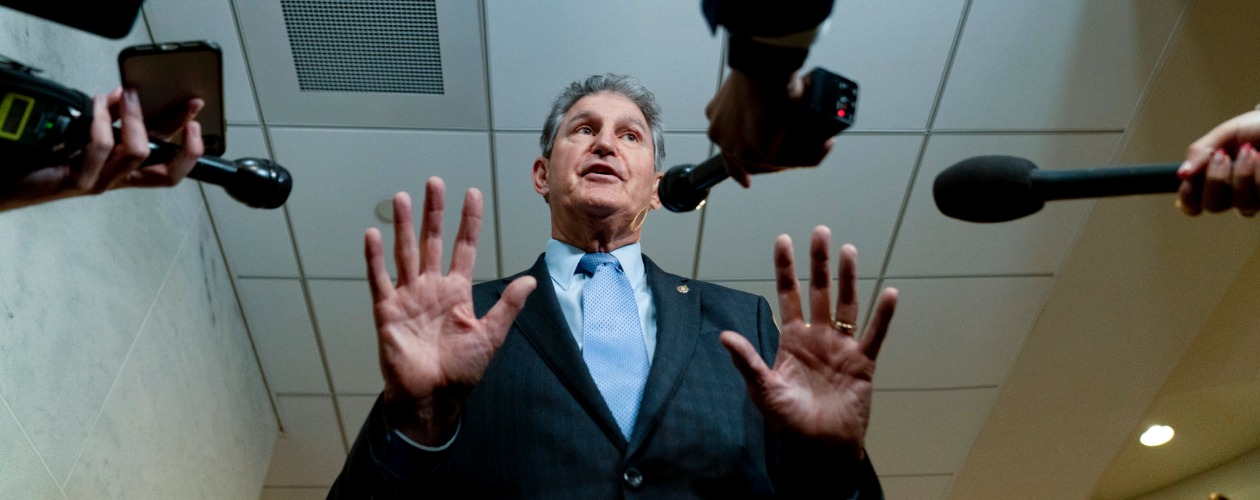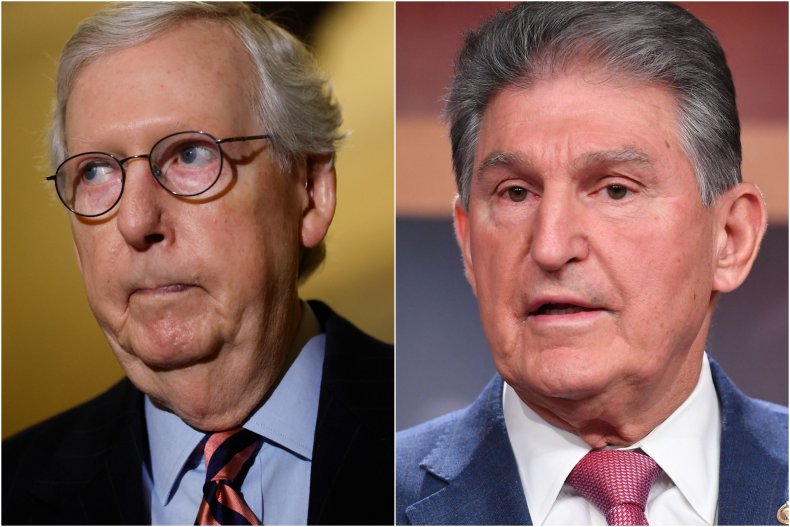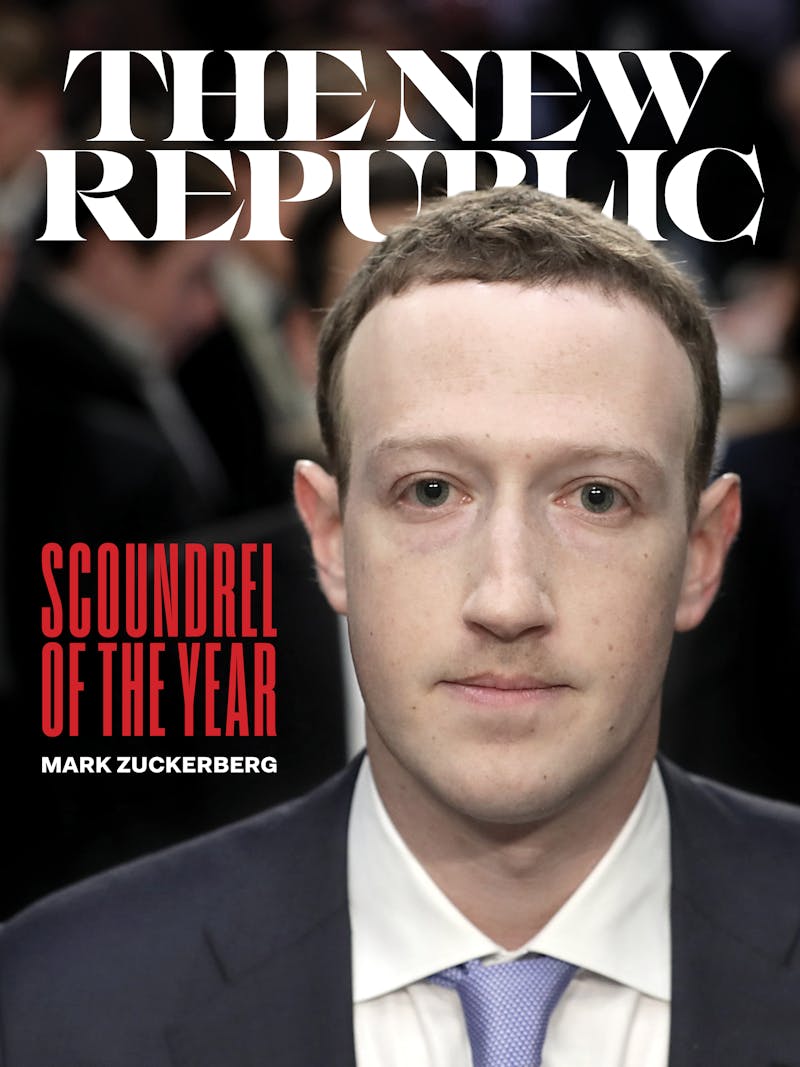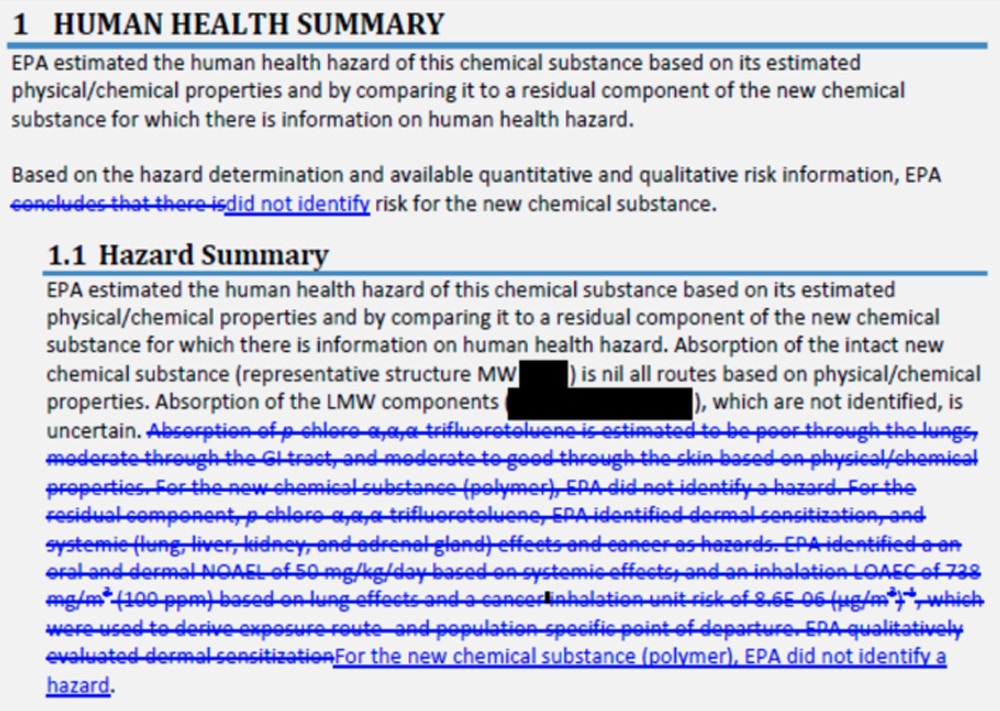
Coal baron: Sen. Joe Manchin, D-W.Va., killed the Build Back Bettter. | Andrew Harnik / AP
WASHINGTON—Joe Manchin has spewed reason after reason for killing President Biden’s signature Build Back Better plan on Fox News and elsewhere over the weekend, leaving out the real reason: Based on campaign contributions and on his personal millions of dollars in wealth, he is a creature of the dirty fossil fuel industry in the United States.
He has given, in the last two days, a host of other reasons behind his knifing of the bill.
Manchin says Democrats have refused to attach “work requirements” to social benefits in the bill. That explanation is particularly outrageous considering that the child tax credits in the current rescue package—which would be extended by the BBB bill—have allowed millions of women and men to return to work.
Melissa Parks, a resident in Chicago’s Wentworth Houses, has three children for each of whom she has been receiving $250, for a total of $750 each month since August. The money has allowed her to take care of her children and work full time since then for a local publishing company. The funds, under Biden’s recovery plan, would continue only if the BBB plan, now killed by Manchin, had passed. “I was able to buy clothing for the children to go back to school, she said, and to pay my rent and buy food. And then go to work full time.
“Now I simply will have not enough to pay rent and buy food. If I feed the children I have to go without. At best it will be packages of ramen noodles in my household.
Parks said she hasn’t fully figured out what to do but that she will try food banks at local churches.
Mancin cares nothing about people like Parks. What really bothers him about the bill is that it impacts his campaign contributors and his own personal wealth, is the section of the bill devoted to battling climate change. What Manchin really wants to kill the most is the bill’s provision to spend $555 billion to switch the country over to wind and solar power and away from fossil fuels, including and especially dirty coal.
His move confirms the fears of progressive congressional lawmakers that they would lose leverage if they approved the infrastructure bill before BBB. They were angry, but not surprised about Manchin’s announcement this past weekend. They point out that Manchin is the man who ran against President Obama’s climate change legislation in 2010 and got elected to the Senate on that platform.
Manchin pulled the typical Republican negotiating trick with the BBB plan. He forced the removal of parts of the bill that would impose penalties on electric utilities that continue to burn coal but, despite those concessions to him, killed the bill anyway.
Manchin has received more campaign money from oil, coal, and gas companies than any other member of the U.S. Senate. Democrats hoped that by substantially weakening penalties against those companies when they violate clean energy standards they could win Manchin’s support. He essentially told them where to go, however, as he announced his opposition to the bill despite those concessions.
Manchin’s talk that he was against penalties for fossil fuel companies but for incentives for clean energy turned out to be just another piece of what, from the beginning, has been bad faith negotiating on his part.
Other “moderate” Democrats who also opposed the bill but backed it in the House, figuring it would fail in the Senate anyway, are, of course, glad that Manchin is taking the beating that they too deserve. Nevertheless, the Biden administration and progressive lawmakers, under pressure from the mass movements in the country, are struggling to perhaps save certain pieces of the bill in smaller form.
Manchin reportedly met with Biden after the initial anger expressed by the White House, and some lawmakers are holding out hope that the $2 trillion bill could be further changed to meet Manchin’s demands.
So-called Democratic moderates are putting forward approaches that they actually preferred from the beginning, approaches far less sweeping than the BBB bill passed by the House and supported by the president. If a few of these elements end up becoming law, these moderates will no doubt try to claim credit for the popular ones when they face voters next year.
“At the start of these negotiations many months ago, we called for prioritizing doing a few things well for longer, and we believe that adopting such an approach could open a potential path forward for this legislation,” Rep. Suzan DelBene, D-Wash., the chair of the “moderate” New Democrat Coalition, said in a statement. “Failure is not an option.”
Despite having condemned Manchin for killing the bill, it is clear the White House would be happy to settle for compromises.
White House chief of staff Ron Klain tweeted DelBene’s statement with praise. Facing unanimous Republican opposition, Democrats need all 50 of their caucus members in the evenly split Senate to support the legislation, or it is certain to fail.
“Just as Senator Manchin reversed his position on Build Back Better this morning, we will continue to press him to see if he will reverse his position yet again, to honor his prior commitments and be true to his word,” White House press secretary Jen Psaki said.
Despite all the speculation about compromises, it is clear that the bill is dead, at least for now.
Senate Majority Leader Chuck Schumer, D-N.Y., said the chamber will vote “very early in the new year” on a changed bill, indicating that he has not totally given up on some type of “compromise.”
“We are going to vote on a revised version of the House-passed Build Back Better Act—and we will keep voting on it until we get something done,” he said.
Democrats see passage of something as critical to their chances in the 2022 midterms.
Millions have just received their last checks of up to $300 per child in tax credits. Unless BBB is passed, there will be no January child aid checks, causing catastrophic results for families that have survived because of those credits. The child tax credit checks have lifted millions of children out of poverty and have allowed mothers and fathers to return to work.
Manchin has been vocal about his reservations about a large social safety net bill throughout the negotiations, prompting House progressives to insist on paring it with the bipartisan infrastructure law. The two bills were unlinked last month after Biden and party leaders pushed to pass the transportation measure.
As the initial anger at Manchin wore off, numerous Democrats sought to take the optimistic view, grabbing on to his hint that he could be open to a restructured package even as he continues lying by saying his chief concerns are, not his personal wealth, but inflation and adding to the national debt.
Progressive anger erupts after Manchin kills Build Back Better
CONTRIBUTOR
John Wojcik is Editor-in-Chief of People's World. He joined the staff as Labor Editor in May 2007 after working as a union meat cutter in northern New Jersey. There, he served as a shop steward, as a member of a UFCW contract negotiating committee, and as an activist in the union's campaign to win public support for Wal-Mart workers. In the 1970s and '80s, he was a political action reporter for the Daily World, this newspaper's predecessor, and was active in electoral politics in Brooklyn, New York.
We are in the ‘Hunger Games’-era of American history
December 21, 2021

Joe Manchin on Facebook.
West Virginia Senator Joe Manchin said Sunday he opposes the president’s Build Back Better bill, the second of two infrastructure packages the Democrats have been negotiating for months. (The first one, focused on “traditional” infrastructure, was enacted last month.)
The news is moving fast. Negotiations appear to be ongoing. To get a better idea of what’s going on, I talked to Monique Judge. She was until recently the news editor for The Root. I asked Monique if Manchin’s surprise announcement made any sense, politically or practically.
Monique Judge: I think on some level, it was expected that Manchin would pull a stunt like this. When questioned about why he did it, his answers don't make sense. He said he was at his "wit's end" but when asked to elaborate, his responses trended on the "they know what they did" thing. NBC News asked if he felt there was still a place for him in the Democratic party. His response: “I would like to hope there are still Democrats who think like I do. I'm fiscally responsible and socially compassionate. Now, if there are no Democrats like that, then they’ll have to push me where they want me." LOL. Bye, Joe
JS: Rachel Bitecofer, the political scientist and data expert, told me this about Manchin’s opposition this morning: "It makes perfect sense to Manchin, who is the last Democrat serving in a realigning West Virginia, which broke for Donald Trump by 35 points in 2020. Manchin will need to win 20 points’ worth of Republican voters to hold his seat in 2024, in a presidential election cycle. That is pretty hard." Thoughts?
MJ: If that’s the case, Manchin is playing a very long game that may not yield the results he’s looking for. And then what? Siding with the GOP is one thing, but attempting to manipulate the people through political machinations would leave a sour taste in people's mouths. After the win, then what? You begin supporting Democratic legislation again? Even with that being a reason, it still is hard to make sense of it.
JS: In your view, does Manchin want a deal at all?
MJ: It's hard to say. It was reported that he went to Biden last week with an outline of his own, which the press secretary said mirrored a lot of the president's plan. If he went to the trouble to create that, you’d think he would follow through. If there are major parts he disagrees with, he could state those plainly and have an alternative solution. At the end of the day, the work still needed to get done. He didn't do that. This is some sort of weird power play. It's hard to say where he is going with it or if he wants to get the work done.
JS: Schumer vows to bring a vote to the Senate floor early next month. The idea is showing Manchin Republicans aren't going to show up the way Manchin says they will show up. If that doesn't work, should Democrats whittle down the BBB even more to satisfy him?
MJ: First of all, Congress needs to stop playing these petty-ass games of one upmanship. It's all ego. It’s not doing anything to help the millions suffering. Enough is enough already with that bullshit.
Second, absolutely not. The bill was already missing major parts that could help, including student loan debt relief – which a lot of people are still calling for. Whittling it down even more would render it almost useless as far as providing relief to Americans struggling and suffering.
JS: There’s an assumption that passing something, anything, is better than passing nothing. That presumes something else: that this legislation is a winner for the Democrats in next year’s midterms.
MJ: I don't know if this is a winner. If anything, I think it could make it harder for some Democrats, because their constituents will see them as not having fought hard enough for the right things. And I don't know if passing "something" is better than passing "nothing." What "something" doesn't help the people? Is that still a good thing?
READ: Watch: Alexandria Ocasio-Cortez unloads on Joe Manchin for killing Build Back Better bill
JS: I'm not sure policy is going to reach swing voters the way some moderate Democrats say it's going to reach swing voters.
MJ: Republicans do whatever they can to sabotage Democratic stuff. They do anything to push their agendas. Democrats seem to want to simultaneously "play nice" and also wag their fingers at naughty Republicans. If Democrats played the game the same way, they could probably get some gains. The time for turning the other cheek is over. It only gets your ass kicked. There is no "fair" when lives are at stake.
JS: My thinking is that Biden needs to get more strident.
MJ: I would agree. He's the president after all. He needs to pull his presidential boxers up and start being more resolute with everyone, Democrats included. For Manchin’s part, he needs to do what he was elected to do: put the needs of the American people before his own.
JS: What could Biden say that would make you cheer?
MJ: He could say he wants to relieve student debt. He could say he wants to uplift the poorer classes. He could say he’s determined to dismantle the carceral system and come up with alternatives to reduce the disproportionate impact on communities of color. He could say he stands behind the federal decriminalization of cannabis.
JS: What’s your sense of hope for the future right now? One to 10?
MJ: It’s a three. We're doomed.
The climate is destroyed. Our economy is unbalanced. People can't afford basic needs. No one seems to want to do anything about it. We have billionaires spending their money going to the front porch of space (not actual space, mind you) instead of giving back to the communities that help keep their bloated businesses afloat. We have a global pandemic that doesn't seem to be going away soon. It has turned us all into one gigantic human science experiment. We are literally waiting to find out which petri dish we are on. Scary times.
JS: Do you have any hope that the Democrats will find courage?
MJ: Only with new blood. The old-timers who don't seem to want to retire are stifling progress, I think. Again, they want to play things "fair" and "by the rules" when we have now entered the Hunger Games-era of US history. The rules don't apply. We read the book. We saw the movie. But we didn’t think it could happen to us. Now here we are.
JS: Monique, many thanks for chatting with me today.
MJ: Thank you for asking me!
John Stoehr is a fellow at the Yale Journalism Initiative; a contributing writer for the Washington Monthly; a contributing editor for Religion Dispatches; and senior editor at Alternet. Follow him @johnastoehr.

BY DARRAGH ROCHE ON 12/22/21
Senate Minority Leader Mitch McConnell (R-KY) said on Tuesday that Senator Joe Manchin (D-WV) would be welcome in the Republican Party following his announcement that he's a "no" on the Build Back Better Act.
While criticizing the "vitriol" directed at Manchin by some in the Democratic Party, McConnell suggested the West Virginia senator could find a new home in the GOP.
McConnell's comments are significant at a time when Manchin is at odds with President Joe Biden and the Democrats and while the Senate is evenly divided between the parties.
The Kentucky Republican told Fox News' The Guy Benson Show on Tuesday that Manchin had done the country a "favor" by apparently killing the $1.75 trillion Build Back Better Act.
Manchin told Fox News Sunday that he was a "no" on the bill after months of negotiations and conflict between moderate and progressive Democrats.
Though a final vote hasn't taken place, without Manchin's support Build Back Better will likely fail to pass.
McConnell said he was "shocked at the vitriol" aimed at Manchin. The White House issued a strong statement about Manchin's Fox News appearance, suggesting he had gone back on his word.
"Basically it seemed to me that they were calling Senator Manchin a liar. I think that was not smart. This is a 50/50 Senate. It's going to be 50/50 for another year, and believe me, this is not how I would handle a disappointing vote like that," McConnell said.
"He doesn't fit well over there, but that is a decision ultimately that he has to make. We certainly welcome him to join us if he was so inclined," he said.
The Senate is currently made up of 50 Republicans, 48 Democrats and two independents who caucus with the Democrats. If Manchin were to change parties, it would alter the balance of power and give the GOP enough seats to make McConnell Senate Majority Leader again. He previously served in that position from January in 2015 to January in 2021.
McConnell isn't alone in calling on Manchin to switch parties, with at least four other GOP senators including Ted Cruz of Texas and Tom Cotton of Arkansas publicly discussing the possibility in recent comments.
While Manchin changing party would have huge national significance, the senator has long resisted suggestions that he should join the Republicans despite factors that appear to point in that direction.
He is considered a moderate or conservative Democrat and represents a state that has been solidly Republican in presidential elections since 2000. Nonetheless, in October he dismissed rumors that he was considering leaving the Democratic Party because of the price tag of the Build Back Better Act.
"It's bulls**t," Manchin told CNN's Manu Raju at the time. "I have no control of rumors."
Manchin also told CNN's Ali Zaslav that he had thought about becoming an independent who caucuses with Democrats, like Senator Bernie Sanders (I-VT), but he had never considered switching to the GOP.
On Monday, Manchin appeared to address his future in the Democratic Party.
"I would like to hope there are still Democrats who think like I do. I'm fiscally responsible and socially compassionate. Now, if there are no Democrats like that, then they'll have to push me where they want me," he said.
Republican attempts to lure Manchin to their side of the aisle may not succeed, but could still be a cause of concern for Democrats as they struggle to maintain a precarious majority and pass President Biden's agenda.









